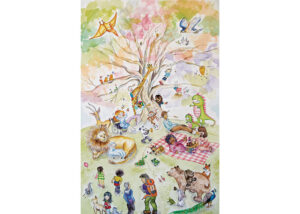How does one define wisdom? It’s difficult to put into words.
Herman Hesse, in his classic novel, Siddhartha, writes: “Wisdom is not communicable. The wisdom which a wise man tries to communicate always sounds foolish. . . . Knowledge can be communicated, but not wisdom. One can find it, live it, do wonders through it, but one cannot communicate and teach it.”
The biblical wisdom tradition does a marvellous job of describing wisdom, rather than defining it. It portrays wisdom as essentially creative, life-giving and feminine. It consistently personifies wisdom as a woman. Everything that exists was made or birthed into reality by wisdom (aptly named Sophia in the Greek language).
The Bible says wisdom was present with God before the beginning of time. Like an ancient, all-seeing sage, she has observed history unfold. More than ancient, she is timeless. She is what has always been, and always will be, true, in every age, for every generation.
Divine wisdom is unbiased and impartial, transcending the superficiality and frailty of human divisiveness, tribalism and ego. She is everywhere, calling out and making herself available to all people regardless of their religion, gender, race, culture, socio-economic status or age.
She is joyful. She sings, she dances, she laughs. She delights in God, human beings and all of creation. Her desire is to help us make good decisions, so we can experience the highest quality of life possible.
Proverbs tell us that wisdom is our friend and our sister. She is powerful but gentle, refusing to force herself or her ways on us. However, she will not save us from the consequences of our decisions. She is generous and long-suffering, but will not be mocked. In fact, if you ignore her long enough, she will mock you when trouble and calamity come upon you. This attitude doesn’t sound very Christian, but I’m not convinced it contradicts the Jesus portrayed in the gospels. Perhaps the problem is not that this aspect of wisdom is “unchristian,” but rather, some aspects of our “Christian” understanding are not wise.
Wisdom is not about academic ability or intellectual prowess. This explains why many smart people are foolish, and many people with average or below-average IQs are wise. Wisdom enters through the heart. One might say that wisdom is more of a soul thing than a head thing, or, using contemporary jargon, we might say that wisdom is more connected to our EQ (emotional quotient) than our IQ. Yet even that is too clinical and categorical.
Wisdom is holistic and practical. She is concerned about the stuff of real life, things like managing and improving one’s physical health, sleep patterns, family relationships, friendships, anxiety, fear, stress, work habits, budgeting skills, character development and our connection to the land.
One of the complexities of wisdom is that she is interconnected and interdependent. Wisdom is, in a sense, the fruit of a symbiotic relationship between knowledge, understanding, discernment and insight. The simplified model of fire requiring heat, fuel and oxygen sheds some analogous light on wisdom’s relationship with her essential ingredients.
In a spirit of reckless optimism, I will attempt the foolhardy task of doing what I’ve implied can’t be done. That is, define wisdom. If for no other purpose, my working definitions of wisdom and her essential ingredients have been helpful in my own pursuit of wisdom:
- Knowledge is comprehending information.
- Understanding is the ability to interpret meaning from information.
- Discernment is the ability to separate, sift or distinguish truth from falsehood, or usefulness from futility, for example. It is the ability to rightly divide or separate the root issue from symptoms or red herrings, or to dissect a complex problem into its many parts to better understand the whole.
- Insight is “having sight into” something or someone. It is the intuitive ability to see into the depth or essence of a thing, person or situation. It is the ability to see the bigger picture—inconspicuous patterns such as hidden causes and effects—of a specific context with clarity.
- Wisdom is the capacity to do the right thing, the right way, at the right time, for the right reason.
Perhaps this pithy distinction by Christopher Reiss is more digestible than my definitions: “Knowledge is measuring that a desert path is 12.4 miles long. Wisdom is packing enough water for the hike. Insight is building a lemonade stand at Mile 6.”
Troy Watson (troydw@gmail.com) is pastor of Avon Mennonite Church in Stratford, Ont.
This is Part 4 of ‘Wisdom, where art thou?’
Read part 1
Read part 2
Read part 3
Read part 5
Read part 6
Read part 7
Read part 8
Read part 9
Read part 10







Leave a Reply
You must be logged in to post a comment.